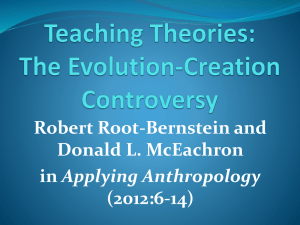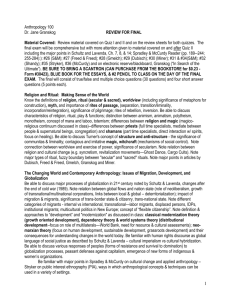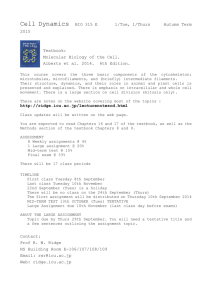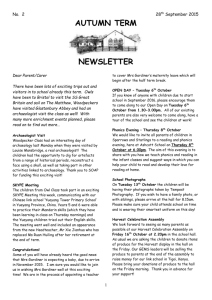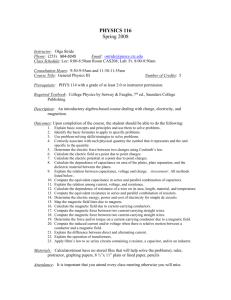ANT 206 “Cultural Anthropology”
advertisement
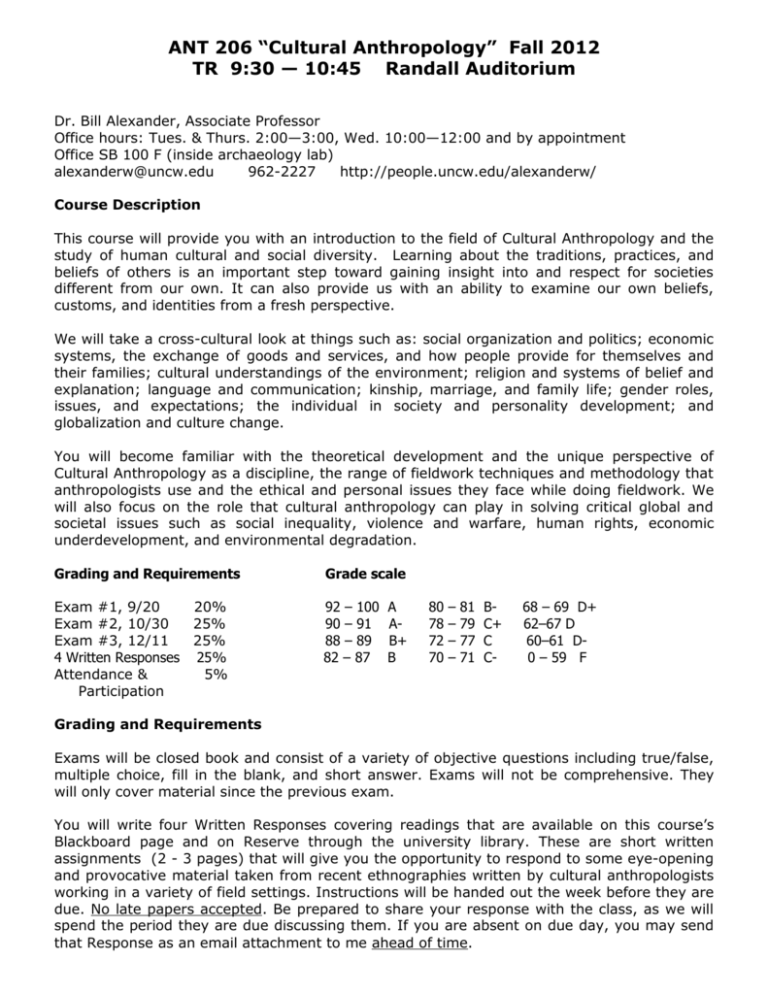
ANT 206 “Cultural Anthropology” Fall 2012 TR 9:30 — 10:45 Randall Auditorium Dr. Bill Alexander, Associate Professor Office hours: Tues. & Thurs. 2:00—3:00, Wed. 10:00—12:00 and by appointment Office SB 100 F (inside archaeology lab) alexanderw@uncw.edu 962-2227 http://people.uncw.edu/alexanderw/ Course Description This course will provide you with an introduction to the field of Cultural Anthropology and the study of human cultural and social diversity. Learning about the traditions, practices, and beliefs of others is an important step toward gaining insight into and respect for societies different from our own. It can also provide us with an ability to examine our own beliefs, customs, and identities from a fresh perspective. We will take a cross-cultural look at things such as: social organization and politics; economic systems, the exchange of goods and services, and how people provide for themselves and their families; cultural understandings of the environment; religion and systems of belief and explanation; language and communication; kinship, marriage, and family life; gender roles, issues, and expectations; the individual in society and personality development; and globalization and culture change. You will become familiar with the theoretical development and the unique perspective of Cultural Anthropology as a discipline, the range of fieldwork techniques and methodology that anthropologists use and the ethical and personal issues they face while doing fieldwork. We will also focus on the role that cultural anthropology can play in solving critical global and societal issues such as social inequality, violence and warfare, human rights, economic underdevelopment, and environmental degradation. Grading and Requirements Grade scale Exam #1, 9/20 20% Exam #2, 10/30 25% Exam #3, 12/11 25% 4 Written Responses 25% Attendance & 5% Participation 92 – 100 90 – 91 88 – 89 82 – 87 A AB+ B 80 78 72 70 – – – – 81 79 77 71 BC+ C C- 68 – 69 D+ 62–67 D 60–61 D0 – 59 F Grading and Requirements Exams will be closed book and consist of a variety of objective questions including true/false, multiple choice, fill in the blank, and short answer. Exams will not be comprehensive. They will only cover material since the previous exam. You will write four Written Responses covering readings that are available on this course’s Blackboard page and on Reserve through the university library. These are short written assignments (2 - 3 pages) that will give you the opportunity to respond to some eye-opening and provocative material taken from recent ethnographies written by cultural anthropologists working in a variety of field settings. Instructions will be handed out the week before they are due. No late papers accepted. Be prepared to share your response with the class, as we will spend the period they are due discussing them. If you are absent on due day, you may send that Response as an email attachment to me ahead of time. Note that there are five Written Response assignments on the syllabus. You are only required to turn in four of them (of your own choosing), but you may do a fifth for extra credit. This is the only extra credit opportunity. No other extra credit assignments will be given. You are required to be an active participant. Attending class and taking part in discussion is expected and is part of your final grade. Arrive on time and don’t leave early. Tardies and early departures will be counted as absences. Use of cell phones is not allowed during class. Turn them off and put them away before you enter. Web surfing, texting, messaging, etc. during class is prohibited. If you are observed online during class you will not be given credit for attendance and/or be asked to leave. It’s very important to complete each meeting’s assigned reading so that we can discuss it during class. Lectures will clarify the texts, but you will have difficulty if you haven’t kept up with the reading. Taking good notes is also necessary as Dr. Alexander will often present material not in the books. You are encouraged to visit him during office hours whenever you feel the need. If you can’t come during office hours, an appointment can be set. Academic dishonesty, cheating, and plagiarism of any kind will not be tolerated and will result in a failing grade (or worse…) Please familiarize yourself with the university’s academic honor code: http://www.uncw.edu/fac_handbook/responsibilities/teaching/honor_code_print.htm and the University Learning Center’s definition of and tips to avoid plagiarism: http://www.uncw.edu/stuaff/uls/Writing-plagiarism.htm Required Texts Emily A. Schultz and Robert H. Lavenda Cultural Anthropology: A Perspective on the Human Condition, 8th ed. Oxford UK: Oxford University Press (2012) William A. Haviland, Robert J. Gordon, Luis A. Vivanco, eds. Talking about People: Readings in Contemporary Cultural Anthropology, 4th ed. New York: McGraw-Hill (2006) The Written Reponse readings can be down loaded from the Blackboard page for this class. They can also be accessed by going to the library reserves homepage: http://library.uncw.edu/web/customerservices/reserves.html After logging in, locate the reserve materials searching by course, department, or instructor. Course Schedule Thurs. 8/23 Introduction to the Class ANTHROPOLOGY & THE CULTURE CONCEPT Tues. 8/28 Schultz & Lavenda Ch. 2 “Why Is The Culture Concept Important?” pp. 19-35 Thurs. 8/30 Talking about People Sally Engle Merry “Human-Rights Law and the Demonization of Culture” pp. 42-44 FIELDWORK EXPERIENCES AND ISSUES Tues. 9/4 Schultz & Lavenda Ch 3 “Fieldwork” pp. 37–65 Thurs. 9/6 Talking about People Marion Benedict “Fact versus Fiction: An Ethnographic Paradox Set in the Seychelles” pp. 17-20; William J. Klausner “Going Native?” pp. 21-23; Jane Mulcock “Ethnography in Awkward Spaces: An Anthropology of Cultural Borrowing” pp. 45-49 Tues. 9/11 Turn in Written Response #1 on reading: Philippe Bourgois “Violating Apartheid in the United States” from In Search of Respect: Selling Crack in El Barrio, 2ne ed. (Cambridge Univ. Press, 2003) HISTORICAL ORIGINS OF THE ANTHROPOLOGICAL PERSPECTIVE Thurs. 9/13 Schultz & Lavenda Ch 4 “Anthropology, History and the Explanation of Cultural Diversity” pp. 67-87 Tues. 9/18 Talking About A People “The Genocidal State: Hutu Extremism and the Origins of the ‘Final Solution’ in Rwanda” pp. 191-196; Neil Whitehead and R. Brian Ferguson “Deceptive Stereotypes about ‘Tribal Warfare’” pp. 218-222; Steven L. Rubenstein “Shuar Migrants and Shrunken Heads Face to Face in a New York Museum” pp. 269-274 Thurs. 9/20 EXAM #1 RELIGION AND WORLD VIEW Tues. 9/25 Schultz & Lavenda Ch 8 “Worldview” pp. 173-197 Thurs. 9/27 Turn in Written Response #2 on reading: Alma Gottlieb “Chapter Four Spiritual Beng Babies“ in The Afterlife is Where We Come From: The Culture of Infancy in West Africa (Univ. of Chicago Press, 2006) Tues. 10/2 Talking about People Isak Niehaus “Witchcraft in Anthropological Perspective” pp. 225-230; Silvia Rodgers “Feminine Power at Sea” pp. 231-233 SOCIALIZATION & THE INDIVIDUAL IN CULTURE, MEDICAL ANTHROPOLOGY Thurs. 10/4 Talking about People Alma Gottlieb “The Anthropologist as Mother: Reflections on Childbirth Observed and Childbirth Experienced” pp. 77-83 Tues. 10/9 Fall Break Thurs. 10/11 Schultz and Lavenda Ch 6 “Culture and Individuals” **start at “The Madness of Hunger” pp. 127-143 Tues. 10/16 Talking about People Amparo Ojeda “Growing Up American: Doing the Right Thing” pp. 74-76 CULTURE & POWER, SOCIAL INEQUALITY Thurs. 10/18 Schultz and Lavenda Ch 9 “Culture & Power” pp. 199-224 Tues. 10/23 Schultz and Lavenda Ch 13 “What Can Anthropology Tell Us about Social Inequality?” pp. 323-351 Thurs. 10/25 Talking about People Jacqueline Urla “Euskara: The ‘Terror’ of a European Minority Language” pp. 69-71 Tues. 10/30 EXAM # 2 DEVELOPMENT, GLOBALIZATION, HUMAN RIGHTS, APPLIED ANTHROPOLOGY Thurs. 11/1 Schultz & Lavenda Ch 10 “Making a Living” pp. 227-251 Tues. 11/6 Talking about People Daniel Stiles “Nomads on Notice” pp. 89-91; Marcus Colchester “Conservation Policy and Indigenous People” pp. 103-108 James Ferguson “The Anti-Politics Machine: ‘Development’ and Bureaucratic Power in Lesotho” pp. 251-257 Thurs. 11/8 Turn in Written Response #3 on reading Steven Gregory “Chapter One The Politics of Livelihood“ in The Devil Behind the Mirror: Globalization and Politics in the Dominican Republic (University of California Press, 2007) Tues. 11/13 Schultz & Lavenda Ch 14 “What Can Anthropology Tell Us about Globalization?” pp. 353-392 Thurs. 11/15 Turn in Written Response #4 on reading: Beatriz Manz excerpt from Paradise in Ashes: A Guatemalan Journey of Courage, Terror, and Hope (California, 2005) Tues. 11/20 Turn in Written Response #5 on reading: Victoria Sanford excerpt from Buried Secrets: Truth and Human Rights in Guatemala (Palgrave-McMillan, 2004) KINSHIP, MARRIAGE & FAMILY LIFE Thurs. 11/22 Schultz & Lavenda Ch 11 “Where Do Our Relatives Come From and Why Do They Matter?” pp. 253-284 Tues. 11/27 287-321 Schultz & Lavenda Ch 12 “Why Do People Get Married and Have Families?” pp. Thurs. 11/29 Thanksgiving Tues. 12/4 Talking about People Serena Nanda “Arranging a Marriage in India” pp. 145149; Lu Yuan and Sam Mitchell “Land of the Walking Marriage” pp. 158-160; Thomas Maschio “The Refrigerator and American Ideas of ‘Home’” pp. 166-167 Exam #3 Tuesday December 11 8:00 a.m. The course satisfies 3 credit hours in the University Studies II Approaches and Perspectives/ Living in a Global Society Learning Outcomes: After successfully completing this course, you will understand and demonstrate knowledge of: The global dimensions of poverty, environmental destruction, and human rights abuses. The specific ways in which participation in the modern world economic system produces both winners and losers in the developed and underdeveloped parts of the world The work of applied anthropologists making a difference through projects on critical issues The challenges of reconciling cultural relativity with universal human rights in the colonial and post-colonial history of globalization You will think critically about problems in your own society and possess the tools to find solutions based on your understanding of: How different cultural understandings of the environment, local-level experiences with economic development projects, reciprocity-based socioeconomic relations, and community struggles for social justice can be useful in thinking about similar and related issues in their own community. The ways in which much of your own action and behavior has implications in the being of others living in different parts of the world well- Finally, you will understand how acceptance of cultural differences and toleration of cultural ambiguity promotes a more equitable and just world. Through a comprehensive, crosscultural comparison you will recognize the value of diversity in identifying: The common ground and diverging perspectives of religions and systems of belief The variability of roles and expectations within the areas of kinship, gender, marriage, family life, and sexuality Critical dimensions of race, gender, and politics through language use.


